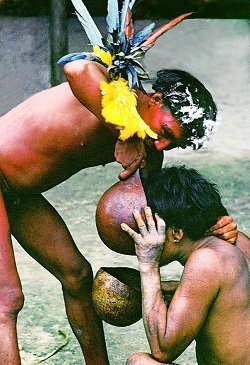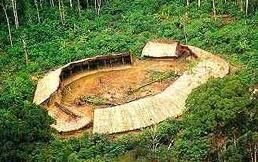The Yanomami tribe, who live spread across 200-250 villages in the Amazon rainforest, practice the traditional death ritual of endocannibalism. This means that loved ones of the person who has died consume his or her flesh as long as he or she was a member of the kin group. A kin group does not singularly mean families; tribes, societies and cultures are also included in the mix.
The Yanomami view cremations as liberating in comparison with burials for their loved ones because decomposition would be a slow, tedious process.
For the Yanomami, they practice endocannibalism because they do not believe that death is a natural occurrence of life. Instead, they believe that a rival tribe’s shaman sent an evil spirit directly to strike someone in the tribe. Therefore, to immediately resolve the issue of what should be done to remove the body, cremation ensues. The Yanomami view cremations as liberating in comparison with burials for their loved ones because decomposition would be a slow, tedious process.
Consuming the ashes serves as a way to keep their beloved tribe member’s spirit alive and well for generations to come. Prior to cremation, tribe members cover the body in leaves and put it in a forest that is not too far away from the shaman, or hut. After allowing nature to take its course on the tribe member for about 30 to 45 days, they collect the bones and proceed to crematation. After cremation, the ashes are mixed together with a soup made from fermented bananas. Everyone in the community must consume the mixture. To accomplish this, gourds filled with the mixture are passed around among kin members and consumption is usually finished in one sitting.
The ashes of these men killed by enemies may linger around for years until the tribe believes that their deaths have been rightfully avenged.
However, an exception to finishing the consumption of ashes (in one sitting) is permitted in the case where enemies have killed Yanomami men. Rather than the entire community consuming the ashes, only the women must do it, and it has to happen on the night that a revenge raid is planned. The ashes of these men killed by enemies may linger around for years until the tribe believes that their deaths have been rightfully avenged. This is due to the Yanomami tribe’s belief that the spirit cannot completely transition to the spiritual world without completely vanishing from the material world. Therefore, the ashes cannot be fully consumed until the matter of avenging the death is resolved so that the late loved one can make the peaceful transition to the spiritual world.

 Yanomami Death Ritual of Endocannibalism
Yanomami Death Ritual of Endocannibalism




 “As Tears Go By” by Marianne Faithfull
“As Tears Go By” by Marianne Faithfull
 “The Sea” by John Banville
“The Sea” by John Banville
 Funeral Favors Offer Visitors a Tangible Memento
Funeral Favors Offer Visitors a Tangible Memento















